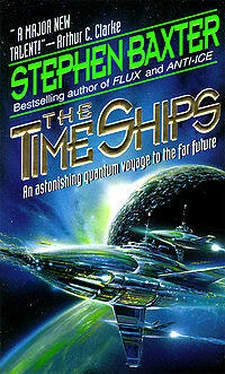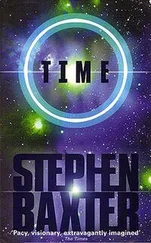“No,” Nebogipfel said obscurely. “The means to manufacture radio-active material will not exist for another several decades.”
Moses looked at the Morlock curiously, but did not take up the point.
I said bluntly, “But you’ve no intention of publishing.”
He gave me a conspiratorial wink — another grating mannerism! — and said, “All in good time. You know, in some ways I’m not quite like a True Scientist — you know what I mean, the careful, miniature sort of chap who ends up known in the Press as a ’distinguished scientist.’ You see such a chap giving his little talk, on some obscure aspect of toxic alkaloids, perhaps, and floating out of the magic-lantern darkness you might hear the odd fragment the chap imagines himself to be reading audibly; and you might catch a glimpse of gold-rimmed spectacles and cloth boots cut open for corns…”
I prompted, “But you—”
“Oh, I’m not meaning to decry the patient plodders of the world! — I daresay I have my share of plodding to do in the years to come — but I also have a certain impatience. I always want to know how things turn out, you see.” He sipped his drink. “I do have some publications behind me — including one in the Philosophical Transactions and a number of other studies which should yield papers. But the Plattnerite work…”
“Yes?”
“I have an odd notion about that. I want to see how far I can take it myself…”
I leaned forward. I saw how the bubbles in his glass caught the candlelight, and his face was animated, alive. It was the quietest part of the night, and I seemed to see every detail, hear the tick of every clock in the house, with preternatural clarity. “Tell me what you mean.”
He straightened his ridiculous masher’s jacket. “I’ve told you of my speculation that a ray of light, passing through Plattnerite, is temporally transferred. By that I mean that the ray moves between two points in space without any intervening interval in time. But it seems to me,” he said slowly, “that if light can move through these time intervals in such a fashion — then so, perhaps, can material objects. I have this notion that if one were to mix up the Plattnerite with some appropriate crystalline substance — quartz, perhaps, or some rock crystal — then…”
“Yes?”
He seemed to recover himself. He put his brandy-glass down on a table close to his chair, and leaned forward; his gray eyes seemed to shine in the candlelight, pale and earnest. “I’m not sure I want to say any more! Look here: I’ve been very open with you. And now, it’s time for you to be just as open with me. Will you do that?”
For answer, I looked into his face — into eyes which, though surrounded by smoother skin, were undeniably my own, the eyes which stared out from my shaving-mirror every day!
Evidently unable to look away, he hissed: “ Who are you?”
“You know who I am. Don’t you?”
The moment stretched on, still and silent. The Morlock was a wraith-like presence, hardly noticed by either of us.
At length, Moses said: “Yes. Yes, I think I do.”
I wanted to give him room to take in all of this. The reality of time travel — for any object more substantial than a light ray — was still in the realms of half-fantasy for Moses! To be confronted, so abruptly, with its physical proof — and worse, to be faced by one’s own self from the future — must be an immense shock.
“Perhaps you should regard my presence here as an inevitable consequence of your own researches,” I suggested. “Is not a meeting like this bound to happen, if you carry on down the experimental path you’ve set yourself?”
“Perhaps…”
But now I became aware that his reaction — far from remaining awe-struck, as I might have expected — seemed rather less respectful. He seemed to be inspecting me anew; his gaze traveled, appraising, over my face, my hair, my clothes.
I tried to see myself through the eyes of this brash twenty-six-year-old. Absurdly, I felt self-conscious; I brushed back my hair — which had not been combed since the Year A.D. 657,208 — and sucked in my stomach, which was rather less well-defined than once it had been. But that disapproval lingered in his face.
“Have a good look,” I said with feeling. “This is how it turns out for you!”
He stroked his chin. “Don’t take a lot of exercise, do you?” He jerked his thumb. “And him — Nebogipfel. Is he—”
“Yes,” I said. “He is a Man from the Future — from the Year A.D. 657,208, and much evolved from our present state — who I have brought back on my Time Machine: on the machine whose first, dim blueprint you are already conceiving.”
“I am tempted to ask you how it all turns out for me — am I a success? will I marry? — and so forth. But I suspect I’m better off without such knowledge.” He eyed Nebogipfel. “The future of the species, though, is another matter.”
“You do believe me — don’t you?”
He picked up his brandy-glass, found it empty, and set it down again. “I don’t know. I mean, it is all very easy for a fellow to walk into a house and say that he is one’s Future Self—”
“But you have already conceived of the possibility of time travel yourself. And — look at my face!”
“I admit there’s a certain superficial resemblance; but it’s also quite possible that this is all some sort of a prank, set up — maybe with malicious intent — to expose me as a quack.” He looked at me sternly. “If you are who you say you are — if you are me — then you have surely traveled here with a purpose.”
“Yes.” I tried to put aside my anger; I tried to remember that my communication with this difficult and rather arrogant young man was of vital importance. “Yes. I have a mission.”
He pulled at his chin. “Dramatic words. But how can I be so vital? I am a scientist — not even that, probably; I am a tinkerer, a dilettante. I am not a politician or a prophet.”
“No. But you are — or will be — the inventor of the most potent weapon that could be devised: I mean the Time Machine.”
“What is it you’ve come to tell me?”
“That you must destroy the Plattnerite; find some other line of research. You must not develop the Time Machine — that is essential!”
He steepled his fingers and regarded me. “Well. Evidently you have a story to tell. Is it to be a long narrative? Do you want some more brandy — or some tea, perhaps?”
“No. No, thank you. I will be as brief as I can manage.”
And so I began my account, with a short summary of the discoveries that had led me to the final construction of the machine — and how I had boarded it for the first time, and launched myself into the History of Eloi and Morlock — and what I discovered when I returned, and tried to go forward in time once more.
I suppose I spoke wearily — I could not remember how many hours had elapsed since I had last slept but as my account developed I grew more animated, and I fixed on Moses’s sincere, round face in the bright circle of the candlelight. At first I was aware of Nebogipfel’s presence, for he sat silently by through out my account, and at times — during my first description of the Morlocks, for example — Moses turned to Nebogipfel as if for confirmation of some detail.
But after a while he ceased to do even that; and he looked only at my face.
[6]
Persuasion and Scepticism
The early dawn of summer was well advanced by the time I was done.
Moses sat in his chair, his eyes still set on me, his chin cupped in his hand. Then, at length: “Well,” he said, as if to break a spell — “Well.” He stood up, stretched his back, and crossed the room to the windows; he pulled them back to reveal a cloudy but lightening sky.
Читать дальше
Конец ознакомительного отрывка
Купить книгу









